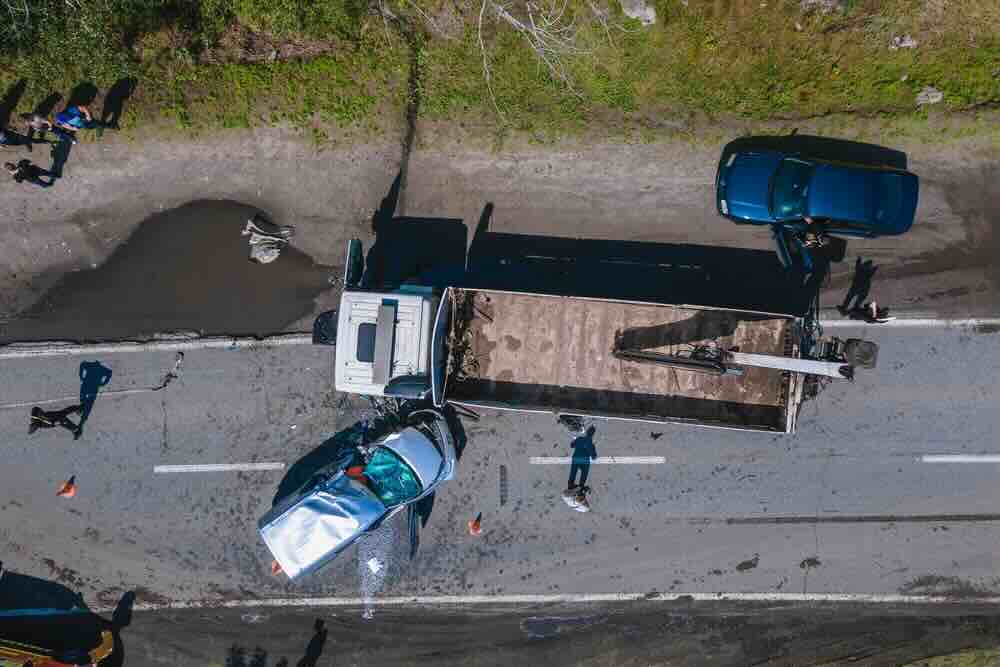
 Request FREE consultation - 1866-758-4529
Request FREE consultation - 1866-758-4529 
When a commercial truck causes a catastrophic crash in Texas, insurance coverage disputes can delay justice. One federal rule—the MCS-90 endorsement—can make all the difference for truck accident victims in Texas.
At Baumgartner Law Firm, we help victims understand how MCS-90 applies and ensure that insurers and trucking companies are held accountable for every dollar you’re owed.
The MCS-90 endorsement is a federally required clause under the Motor Carrier Act of 1980 (49 U.S.C. § 13906). It attaches to a motor carrier’s liability policy. It ensures the insurer pays for injuries or property damage caused by a carrier operating in interstate commerce, even when the policy itself would normally deny coverage.
In simple terms, MCS-90 acts as a safety net for the public, guaranteeing victims receive payment even when the trucking company’s insurance tries to avoid liability. After payment, the insurer can seek reimbursement from the carrier—but that does not affect your right to compensation.
Under 49 C.F.R. § 387.9, motor carriers must maintain these minimum levels of coverage:
| Type of Cargo | Minimum Coverage Required |
| Non-hazardous property | $750,000 |
| Oil or hazardous materials | $1,000,000 |
| Explosives or highly hazardous cargo | $5,000,000 |
These apply nationwide, including Texas. However, catastrophic injury and wrongful-death cases often exceed these limits, which is why you need experienced legal representation to identify all available coverage.
The MCS-90 applies when:
The endorsement compels the insurer to pay third-party victims up to the federal minimum—even when the policy itself would not.
The endorsement usually does not apply to intrastate carriers operating only within Texas. Those companies fall under:
Typical intrastate liability limits range from $500,000 to $1,000,000, depending on vehicle size and cargo. While MCS-90 may not apply, these Texas-specific statutes still ensure injured parties have access to compensation.
Truck-accident cases often involve overlapping federal and Texas laws, including:
A qualified Texas truck-accident attorney will analyze both federal filings and state insurance laws to determine whether MCS-90 applies and what coverage is enforceable.
According to the Texas Department of Transportation (TxDOT), there are over 22,000 commercial-vehicle crashes statewide each year, many resulting in life-altering injuries or death.
Because many trucks operate across state lines on I-10, I-35, I-45, and I-20, the MCS-90 endorsement often comes into play in Texas claims. It prevents insurers from using technical loopholes—like unlisted vehicles or driver exclusions—to deny compensation.
Without MCS-90, many victims would face financial ruin after a devastating truck accident. With it, federal law ensures there’s a guaranteed source of recovery.
Imagine a Louisiana-based trucking company hauling goods from Houston to Baton Rouge. The driver causes a multi-vehicle crash near Beaumont, injuring a Texas family.
The insurer claims the truck was not listed on the policy and refuses coverage.
Because the policy includes an MCS-90 endorsement, the insurer must still pay the injured victims up to the federal minimum, even though coverage was otherwise excluded. This ensures justice and recovery for the victims, not a loophole for the insurer.
If you’re injured in a crash involving a commercial truck, follow these steps:
No. MCS-90 only applies to interstate motor carriers. Intrastate Texas carriers are governed by Texas Transportation Code § 643.101 and 37 TAC § 4.11.
Usually, no. MCS-90 does not create an independent cause of action. The insurer’s obligation arises only after you obtain a final judgment against the motor carrier.
No. It ensures the federal minimum ($750K–$5M) is available, but it doesn’t expand coverage beyond those limits.
The MCS-90 endorsement still requires the insurer to pay the victim, even if the motor carrier is insolvent, protecting the public from unpaid judgments.
A skilled truck-accident lawyer can review FMCSA filings, obtain the policy and endorsement, determine whether the trip was interstate, and enforce your right to payment.
At Texas Truck Accident Lawyer, we’ve represented truck-accident victims across Texas for over 40 years. Attorney Greg Baumgartner, who holds dual law degrees and is a graduate of the Trial Lawyers College, has built an undefeated record in catastrophic truck-injury and wrongful-death cases.
Call for your Free Consultation- (281) 893-0760